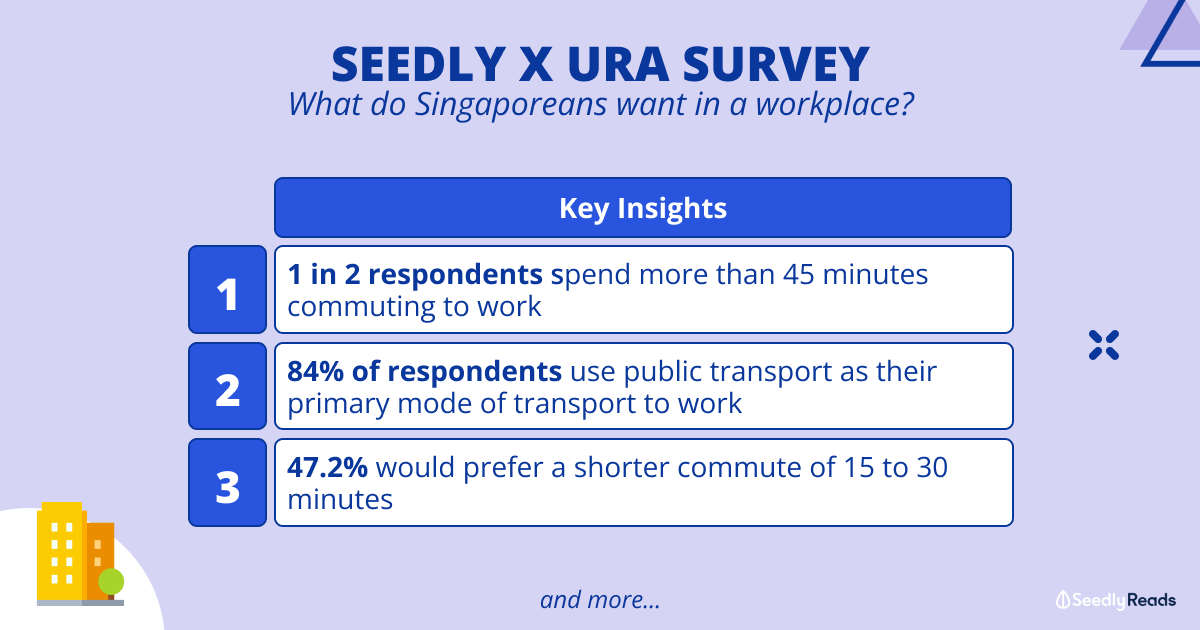Long-term planning has been fundamental in Singapore’s development into a vibrant global economic hub, and in providing good job opportunities for Singaporeans.
Over the years, the Urban Redevelopment Authority (URA) has planned and established diverse business nodes across the island, from our Central Business District (CBD) and industrial estates to regional centres, to support this goal.
URA is continuously reviewing Singapore’s land use plans to address evolving economic trends and workplace preferences, to sustain a competitive economy that also meets Singaporeans’ aspirations.
We have teamed up with URA to conduct this survey, to better understand the priorities and factors that influence working adults’ workplace preferences, such as commute time, amenities and work location.
Read on to find out more!
Disclaimer: The information provided by Seedly serves as an educational piece. The survey is not weighted against the national population and is only a representative sample. Figures presented are rounded to the nearest decimal place.
Survey Methodology
The survey was conducted online and involved a sample of 954 individuals in Singapore. The survey was distributed via Seedly’s social media channels, ensuring a diverse group of respondents from various industries, education levels, and residential areas were represented.
The survey gathered data through multiple-choice, rating, and ranking questions. We analysed commute times and behaviours, as well as how location preferences vary among workers. These findings provided valuable insights into the key factors affecting preferences for workplaces in Singapore’s evolving workforce.
Demographics of Survey Respondents
67% of respondents fall between the age ranges of 25 to 39, and are likely to be in their early to mid career phases. 66.8% of respondents hold at least a Bachelor’s degree.
The survey analysis henceforth includes only responses from employed (full time and part-time) and self-employed individuals, who made up 94.3% of all respondents.
This data reflects only the survey respondents and may not represent Singapore’s overall working population.
Respondents come from a wide spread of industries where respondents are working in, with a mass majority falling in the Finance & Banking (16.6%), Healthcare & Biomedical Sciences (13.3%), and Information Technology (12.4%) sectors.
Singaporeans and Their Workplaces
4 in 10 Respondents Commute Daily During a 5-day Work Week
Q: How often do you commute to work in a 5-day work week?

44.8% of respondents commute to work 5 days a week while 37.5% commute at least 3-4 times a week to work.
1 in 2 Respondents Spend More Than 45 Minutes Commuting to Work
Q: How much time do you usually spend commuting to work?

The findings show that over half of respondents (56.2%) spend 45 to 120 minutes commuting to work.
Q: Which area do you currently live in?

The residences of respondents are well spread out across the country, with about a quarter residing in the West region.

In contrast, workplaces in Singapore are largely concentrated in the Central region, with 49.8% of respondents with workplaces there.
These findings highlight the need for decentralisation to bring workplaces closer to homes for shorter commute times.
Q: In the last 6 months, what is your mode of transport when commuting to work?

84% of respondents use public transport as their primary mode of transport to work.
What Do Singaporeans Want in a Workplace?
Proximity to Home and Accessibility Via Public Transport Are Top Considerations
Q: Which of these factors would describe your ideal work location (assuming you work from the office)?

Top priorities for an ideal work location among respondents are proximity to home (81.2%), walking distance to an MRT station (80.1%), and access to hawker centres or food courts (66.5%).
This suggests that convenience, particularly regarding commute time and accessibility to public transport and affordable dining options is highly valued by poll respondents.
Q: On a scale from 1 to 5, how important is the accessibility (e.g. connectivity to MRT and bus networks) of the workplace to you when choosing a job?

The data shows that accessibility, such as proximity to MRT and bus networks, is a major factor in job selection, with 62.1% of respondents rating it as most important. This suggests that convenient transportation access is a key priority for many employees when choosing a workplace.
Now that we have an overview of how respondents are commuting to work, let’s take a look at what the ideal commute would be.
Q: What would be your ideal commute time to work?

The findings show that over half of respondents (56.2%) spend 45 to 120 minutes commuting to work. Amongst them, nearly half (47.2%) would prefer a shorter commute of 15 to 30 minutes.
In conclusion, the survey results revealed that poll respondents identify shorter commutes, easy access to public transport, and amenities, as top priorities that influence their preferences for workplaces.
In light of these findings, how will upcoming plans for our business nodes in the North, East and West regions address them? In what ways would these plans also drive a future-ready economy for Singapore?
Click to explore how URA is enabling sustainable growth and shaping the future of work
P.S. We are also holding a Seedly x URA meetup where you can meet directly with the people at URA on 7 December 2024 and find out more in person!
Click on the button below to find out more and register for free:
Register

